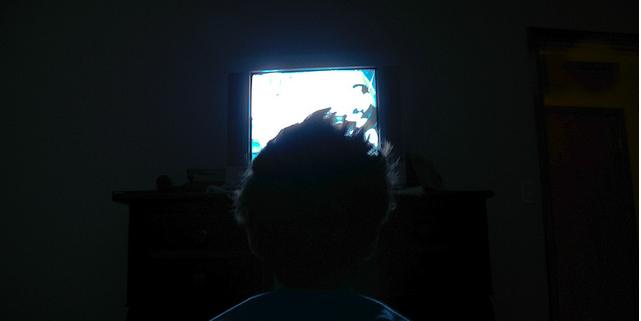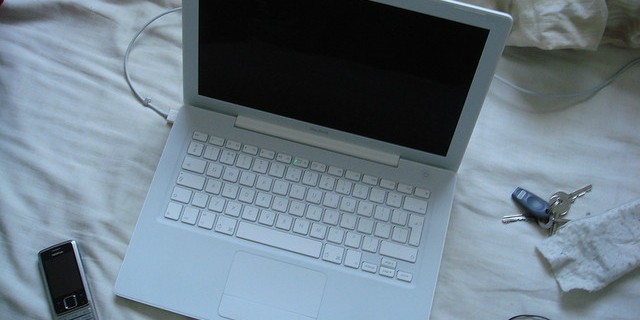Do you often find yourself up late at night, basking in the cool glow of your television or smartphone? If so, your sleep quality may be taking a hit.
Several recent studies have shown that these devices actually steal sleep from kids and adults alike. What makes this a problem is that more people than ever are using electronics in the bedroom. Here’s a few stats demonstrating the pervasiveness of the issue:
- The 2014 Sleep in America poll by the National Sleep Foundation estimates that 89% of adults and 75% of children have at least one electronic device in their bedrooms.
- Their 2011 poll found that in the hour before bed, up to 95% of adults regularly use tech and electronic devices.
- Younger people are more likely to use smartphones, laptops and play video games, while older adults are more likely to watch TV.
- Pew Research polls also found that two-thirds of adults take their smartphones to bed (that jumps up to 90% for 18 to 29 year-olds!).
Read on to learn why you should banish electronics from your bedroom and for tips on sleeping better after your digital detox.
Five Ways Electronics Affect Your Sleep and Health
Electronics work on your physical body and on your mind, which can affect your sleep schedules and contribute to sleep deprivation. Here are five of the most important ways electronic devices like smartphones, computers and TV alter your slumber.
1. Blue Light Suppresses Melatonin
It is well-established that light plays a powerful role in the regulation of our internal circadian rhythms. Electronics like televisions, smartphones, tablets, computers and even LED lights emit blue light, which is believed to be particularly important when it comes to sleep.
Recent research from Harvard and University of Toronto researchers found that light in the blue spectrum acts on our bodies by suppressing natural melatonin. Since melatonin is the hormone that induces drowsiness, delaying its release means more time spent awake and greater difficulty getting sleepy.
2. Stimulation and Stress Keep Your Mind Awake
Active and engaging electronics like tablets, laptops, smart phones, and televisions stimulate your mind and distract you from sleeping. A recent Norwegian study correlated computer and mobile phone use before bed in particular with increased insomnia.
But, falling asleep is only part of the issue. In the 2011 NSF poll mentioned earlier, 10% to 20% of younger adults admitted to waking up multiple times per week due to disturbances from their phones and 26% admitted to texting or emailing after initially going to sleep in the 2014 poll.
Waking up to check your phone in the middle of sleep can affect deep sleep and make it harder to get back to bed. And if checking those work emails or social media accounts brings you stress, that can make it even more difficult to sleep.
(Photo by Sharon Drummond, courtesy Flickr.com)
3. Regularly Missing Sleep Sets the Stage for Weight Gain
While weight and obesity depend on several factors, sleep habits do appear to play a role according to research from the past few years.
One childhood study recently published in the BMC Public Health journal found overweight children slept less than normal weight kids, which authors linked with chaos in the home as well as unchecked screen time, TVs in bedrooms and other factors.
Another Brigham Young University study found that young women with inconsistent sleep schedules were more likely to have higher body mass index ratings than consistent peers. A large scale study of nurses also found that short sleep increased obesity risk over time.
It is believed that consistent sleep deprivation acts on the body’s physical metabolism and extra hours awake means extra hours to eat, both of which can contribute to weight gain.
4. Delayed Sleep and Wake Lag Can Affect Health and Productivity
An Australian survey of teenagers found that greater use of electronics (including phones, computers and TV, but not radios) was associated with greater delays to sleep/wake schedules and waking up later.
In the 2014 NSF poll, children who had electronic devices on at night in their rooms had the highest reports of fair to poor sleep, while those who left electronics off had the highest reports of excellent sleep. Children who had electronics on sometimes also had lower average sleep duration than kids whose electronics were off or not in their bedrooms.
In children, teens and adults alike, getting insufficient sleep is associated with impaired cognition and learning, impaired memory, impaired decision making, daytime fatigue and a wide range of health problems over time.
5. Associating Your Bed with Other Activities Can Make Sleep Harder
Doing non-sleep activities in bed like watching TV, playing games, working or studying can be bad for sleep. Basically, the more things your brain associates your bed with, the less it thinks of sleep when you are there.
Sleep hygiene experts recommend reserving the bed for rest only to train your mind for better sleep. If you can’t sleep after several minutes, it is better to get out of bed and do something like read or listen to music until you feel sleepy.
(Photo by mik_p, courtesy Flickr.com)
Detaching from Electronics and Sleeping Better
Here are a few helpful strategies for weaning yourself or your kids off of electronics in the hours before bed along with other recognized sleep hygiene tips.
Institute a digital detox in your home.
Set an off limits time for televisions, computers, video games, tablets and cell phones, and have everyone check their smaller devices in a central location if needed.
Kill the TV and dim lights two hours before bed.
In the hours before bedtime, start reducing bright lights and turning off the televisions. Consider swapping the bright lights in a couple of lamps for reddish or orange-toned bulbs for better evening lighting. Harvard researchers also suggest wearing blue light-blocking glasses for night owls and shift workers.
Turn phones to silent at night.
Make sure everyone’s phones are set to silent at night to avoid disturbances, especially if you feel like you must sleep with it nearby. If you are worried about missing emergency phone calls, there are apps that will screen calls during certain times or block certain notifications until morning so you can get undisturbed rest.
Swap electronics for other relaxation activities.
If you are worried about being bored without your gadgets at night, there are still many calming and non-electronic things you can do to wind down. Read with dimmer light, journal about your day, try yoga or meditation, chill out to favorite songs, or find other ways to relax.
Tune up your sleep hygiene and bedtime routine.
Healthy sleep habits include sticking to regular bed and wake times, allowing for at least seven hours of rest per night, getting regular sunlight and exercise during the day, keeping rooms cool, and limiting stimulants. A normal pre-bedtime routine can also help you get ready for sleep. A routine might follow a pattern like: shower, get tomorrow’s outfit ready, sip some tea, read a little, brush your teeth, stretch, and then hop into bed.
Reducing electronics at night might take a little getting used to, but the benefits of better sleep and a healthier body and mind are well worth it. Remember, all of your e-mails, games and social media accounts will still be waiting for you in the morning!
Featured photo credit: crumpart via flic.kr














































